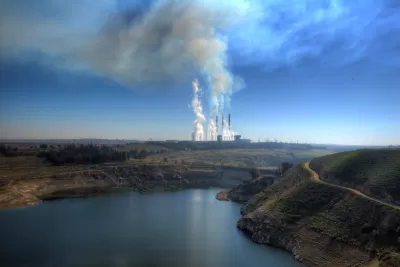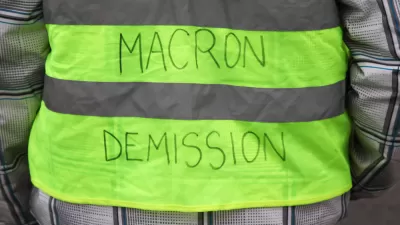A new report from the Center for Climate and Energy Solutions reveals that over 1,200 global and domestic companies, recognizing the threat of climate change, are either pricing emissions or considering it.

"While the president has suggested that tackling climate change will undermine the economy and hamstring businesses, and announced his intention to pull the U.S. out of the Paris climate accord, chief executives have been busy voluntarily putting a price on their own carbon dioxide emissions," reports Sophie Yeo for The Washington Post.
The report, "The Business of Pricing Carbon: How Companies are Pricing Carbon to Mitigate Risks and Prepare for a Low-Carbon Future," was released on Sept. 12 by C2ES – the Center for Climate and Energy Solutions – "an independent, nonpartisan, nonprofit organization working to forge practical solutions to climate change," previously known as the Pew Center on Global Climate Change.
“Many companies are leading the way toward a low-carbon future," said C2ES President Bob Perciasepe.
They see the risks of climate impacts to their businesses and the opportunities to create jobs and increase their competitiveness through clean and efficient energy. Internal carbon pricing is one innovative tool more companies can explore to show sustainability leadership to their shareholders, employees, and customers.
"The findings are based on information disclosed to CDP, formerly known as Carbon Disclosure Project, an organization that helps investors, companies and cities track greenhouse gas emissions, as well as the companies' sustainability reports," writes Yeo. See the group's September 2016 report, "Embedding a carbon price into business strategy" [pdf].
The CDP found that 517 companies have put a price on carbon and 732 are planning to do so in the next two years. [...] About 80 firms in the United States have a price on carbon and 130 plan to do so in the next two years, according to the CDP.
Two types of internal carbon pricing
Some companies may choose to do this with a carbon fee, assigning a sum of money to CO2 emissions. The revenue will often be used by the business to fund emissions reduction measures such as purchasing renewable energy or boosting energy efficiency.
Others may use a 'shadow price' – a hypothetical cost applied to CO2 within a company. Although this doesn't involve handing over any real money, businesses can use it to inform their decision-making, such as when to invest in a low-carbon alternative.
Prices vary widely, "from $2 to $893 per metric ton of carbon dioxide equivalent," according to C2ES.
Why do it?
Listed reasons for adopting internal carbon prices include: "to reduce emissions, respond to shareholder concerns about climate-related business risks, build resilient supply chains and portfolios, increase competitiveness, regulations, and demonstrate corporate social responsibility."
Yeo adds, "Despite Trump's exit from the Paris deal, many chief executives think it is just a matter of time until they face more stringent climate regulations. They figure that moving to an internal carbon price ahead of time would reduce the shock."
Note that as of Sept. 17, officials in the Trump administration have signaled that the U.S. may still remain in the Paris accord, despite the president's earlier decision.

Alabama: Trump Terminates Settlements for Black Communities Harmed By Raw Sewage
Trump deemed the landmark civil rights agreement “illegal DEI and environmental justice policy.”

Planetizen Federal Action Tracker
A weekly monitor of how Trump’s orders and actions are impacting planners and planning in America.

The 120 Year Old Tiny Home Villages That Sheltered San Francisco’s Earthquake Refugees
More than a century ago, San Francisco mobilized to house thousands of residents displaced by the 1906 earthquake. Could their strategy offer a model for the present?

Ken Jennings Launches Transit Web Series
The Jeopardy champ wants you to ride public transit.

BLM To Rescind Public Lands Rule
The change will downgrade conservation, once again putting federal land at risk for mining and other extractive uses.

Indy Neighborhood Group Builds Temporary Multi-Use Path
Community members, aided in part by funding from the city, repurposed a vehicle lane to create a protected bike and pedestrian path for the summer season.
Urban Design for Planners 1: Software Tools
This six-course series explores essential urban design concepts using open source software and equips planners with the tools they need to participate fully in the urban design process.
Planning for Universal Design
Learn the tools for implementing Universal Design in planning regulations.
Clanton & Associates, Inc.
Jessamine County Fiscal Court
Institute for Housing and Urban Development Studies (IHS)
City of Grandview
Harvard GSD Executive Education
Toledo-Lucas County Plan Commissions
Salt Lake City
NYU Wagner Graduate School of Public Service





























